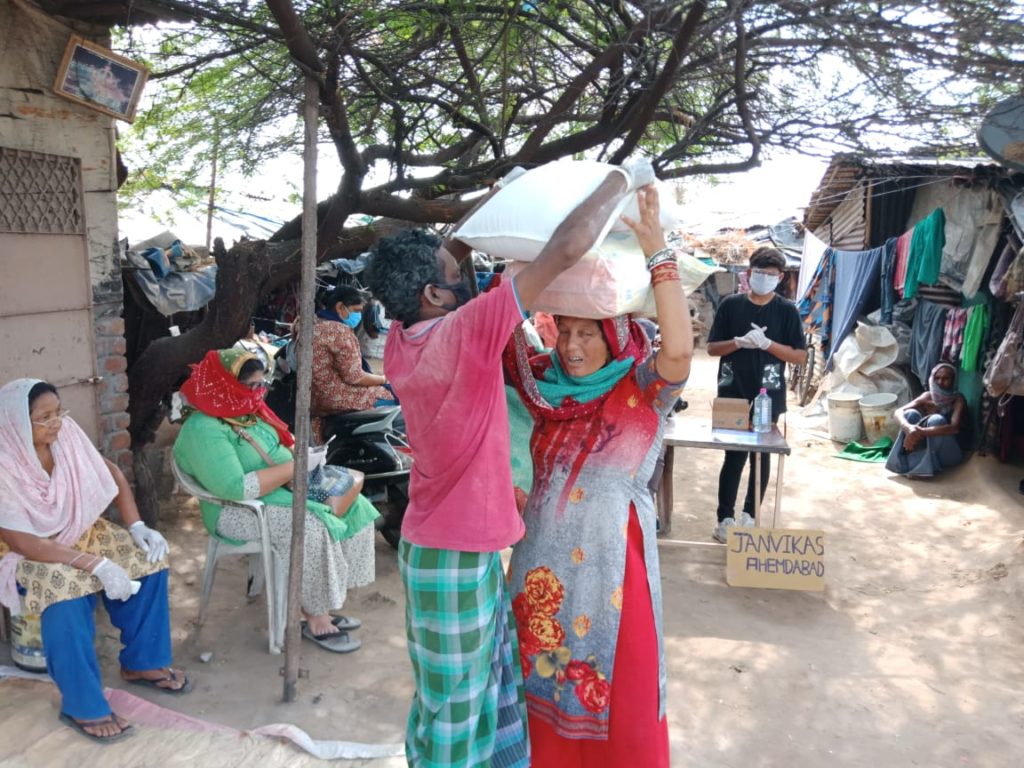Image: Collage with the logo of the Global Forum on Migration and Development, a unique collaborative space that brings together governments, civil society, the private sector, and municipal authorities to explore ways to make migration work for all. © JM/ICMC
The COVID-19 pandemic has been particularly devasting for migrants, with disproportionate health, social, and economic impacts. It has sharpened deep-seated problems and intensified existing gaps in protection. On the positive side, it has created a marginal but heightened awareness of the contributions of migrants and the need for systemic change.
In 2020, ICMC-coordinated civil society advocacy called for inclusive pandemic response and recovery plans, urging all stakeholders to seize the opportunity to build back differently to address underlying gaps and discriminations.
Implementing Rights-Based Policy
ICMC continued to provide leadership for the Civil Society Action Committee in 2020, serving as the secretariat for and co-convening this global civil society network on migration, the largest in the world. As global efforts intensified to halt the spread of the coronavirus, the Action Committee emphasized the urgent need to adopt a COVID-19 response approach that includes migrants and refugees.
The 7 April joint statement “First, Save Lives!” called on government authorities at all levels to take steps to protect uprooted people and recognize their vital role as frontline responders and essential workers. Among priority actions, the NGOs recommended ensuring access to shelter and to healthcare, social, and emergency services; releasing migrants from unprotected immigration detention; enacting measures to ease congestion in camps; and involving displaced people in decision making.
Signed by more than 300 civil society organizations globally, the statement advocated solidarity with migrants and refugees, and included good COVID-19 response practices by States and Inter-Governmental bodies.
In June, the Action Committee released a report mapping out how civil society engaged to put the Global Compact for Safe, Orderly, and Regular Migration (GCM) into action during 2019, the first year of implementation. The publication also considers the pandemic’s impact on efforts to make migration safer and more regular using the GCM and suggests strategies to move forward with implementation in a COVID era.
The GCM’s 23 objectives were the focus of an in-depth webinar series co-launched by the Action Committee in September. The weekly online discussions took stock of global progress putting into action each of the landmark agreement’s objectives two years after its adoption. In 2020, participants from governments, civil society, local authorities, and the private sector reviewed the first 15 GCM objectives.
In conjunction with the GCM Objectives Review series, the Action Committee joined with three civil society partner organizations to offer the “Learn, Act, Make Change” program. The 6-month, online certificate aimed to educate policymakers and academics about different aspects of migration, including in the context of COVID-19, and so equip them to work for migration that benefits all.
The Action Committee published the foundational paper “Which way forward on the implementation of the Global Compact for Migration in the era of COVID-19?” in December. Drawing on the webinar discussions around progress on GCM objectives, the publication calls for a fundamental shift in orientation.
As the pandemic exposed policies that make migrants more vulnerable, the Action Committee urged an implementation approach that focuses on better lives and sustainable futures. The paper proposes GCM Objective 5 — expanding regular pathways — as the cornerstone for implementation. It also stresses the need to build on the GCM’s global reach through increased international cooperation (Objective 23). The paper concludes with recommendations for action by civil society, States, and other actors.
Building Back Better for Migrants
ICMC ensured strong civil society engagement in the Global Forum on Migration and Development (GFMD) in 2020 as the State-led international and multi-stakeholder platform addressed migration-related issues against the backdrop of the COVID-19 pandemic.
Through its role as the GFMD Civil Society Coordinating Office, ICMC gave leadership to one of the GFMD’s four mechanisms, dialoguing with governments, the business sector, and mayors to identify and replicate policies and practice that make migration work for all. This included representing civil society on the advisory group to the 2020 GFMD Chair, the United Arab Emirates, and coordinating the mechanism’s input for thematic priorities.
At Friends of the Forum meetings in July and October, ICMC emphasized the ever-crucial, hallmark role of the GFMD in fostering partnerships in the context of COVID-19. ICMC Director of Policy Stéphane Jaquemet urged GFMD representatives to continue working together to put into action concrete, rights-based migration solutions and pandemic responses that include migrants.
![]()
The discussion on migrants has to be reframed, from start to end. Our time offers the opportunity for an overall global reset.
Onyekachi Wambu, civil society rapporteur at the GFMD Regional Consultation for the Europe region
ICMC brought civil society perspectives and experience to bear in two GFMD ad hoc working groups formed in 2020, one on the Impacts of COVID-19 on Migrants, Migration, and Development and the other on Public Narratives on Migration.
ICMC coordinated civil society’s contributions to the respective working group’s in-depth look at how GFMD stakeholders can address migration and development issues brought to the forefront by the global pandemic. In recommendations for the paper “Lessons Learned from Covid-19 Prevention, Response, and Recovery,” civil society advocated for universal access to vaccines and basic services, justice for wage and benefit theft, increased aid funding, alternatives to detention, support for women, and a focus on children’s rights and protection. ICMC also brought a statement on behalf of civil society outlining 11 points in support of extending the working group’s mandate.
GFMD Regional Consultations were held for the first time in 2020. This dialogue platform with all four Forum mechanisms allowed for broader input from the grassroots level for the annual GFMD Summit. ICMC facilitated preparatory meetings in each region so that the experiences of over 100 civil society representatives were brought to the regional consultations by a civil society rapporteur and thus shaped Summit background materials.
The civil society rapporteurs at the consultations for the Africa, Americas, Asia Pacific, Europe, and West and South Asia regions lifted up issues of regular migration and regularization, skilling of migrants, broad-based partnerships, and COVID-related challenges like wage and benefits theft, and economic fragility laid bare by the pandemic.
Civil society advocacy throughout the year culminated in the 13th GFMD Summit on 18–26 January 2021. The pandemic also served as the backdrop for the Forum’s annual high point, with a first-ever online format and a focus on adapting and revisioning migration governance in a COVID world. Another new feature was the opening of all Summit sessions to all GFMD groups, which allowed increased civil society engagement.
Immediately ahead of the Summit, the Coordinating Office organized the four-day Civil Society Preparatory Meeting with some 185 delegates to develop collective recommendations for dialogue with government representatives and other stakeholders. After intense discussion in break-out sessions, the participants identified four core advocacy priorities to guide civil society participation at the Summit:
- social protection for all migrants
- regularization and regular migration pathways
- fighting xenophobia and discrimination
- safe access to services, including the justice system
During the preparatory meeting’s final plenary, delegates decided to advocate for a bold course of action in response to the COVID pandemic — seizing the opportunity to build back better so that migrants are not left behind.

As we deal with the consequences of COVID-19, we cannot rebuild what was broken in the [labor migration] system by reproducing how it was before the pandemic.
Stéphane Jaquemet, ICMC Director of Policy, reflecting on the 13th GFMD Summit
ICMC coordinated civil society action throughout the Summit, with panelists at roundtable discussions on, inter alia, promoting positive narratives, fostering partnerships, closing gaps in protection, preventing irregular migration, and skilling migrants for employment.
A two-part civil society networking session, a dedicated space for dialogue between governments and civil society, emphasized the need to interweave the mechanism’s four core advocacy priorities into global pandemic recovery. And the Summit side event organized by civil society urged collective action to combat wage theft. At the close of the Summit, the Coordinating Office stressed the crucial role of the GFMD in ensuring that migrants and their rights are at the center of solutions to the COVID crisis.
MEMBER’S STORY
Working Together in an Era of Change
The 13th Global Forum for Migration and Development Summit was about the kind of changes to be developed and implemented in a time of what Pope Francis has called “epochal change,” says Father Fabio Baggio, Under-Secretary of the Vatican’s Migrants and Refugees (M&R) Section.
The M&R Section has participated, as part of the Holy See’s official delegation, in the Global Forum for Migration and Development (GFMD) events for the past four years. At the 13th GFMD Summit a topic of particular concern was the disastrous impact of COVID-19 on migrant workers.
Reports had been coming in to the M&R Section during the year from Catholic-inspired organizations throughout the world, says Fr. Fabio Baggio. Stories of migrants losing their jobs, being forced to return to their country of origin, being denied social assistance. Stories of the most vulnerable being excluded or neglected. Stories that reveal the brokenness of underlying economic and social systems.

The disastrous impact of COVID-19 on migrant workers was a topic of particular concern for the M&R Section during the GFMD Summit. Photo: Catholic-inspired organizations in India provided food and shelter to migrant workers stranded because of the lockdown. Photo source: Indian Social Institute.
For the M&R Section, the multilateral GFMD offers a space for these realities and needs of local migrant communities to be heard. It is an opportunity to “bring issues to the table and to discuss together with other relevant experts how to implement the Global Compact [on Migration],” says Fr. Fabio Baggio. The overarching aim is ensuring that all people including migrants and refugees can develop as integral human beings, he adds.
Fr. Fabio Baggio notes how important it is that the GFMD has widened over the years to include the private sector, youth, and municipal authorities. This has introduced new perspectives about issues that impact migrants and the future of labor migration, as well as new partnerships.
He fervently hopes that GFMD dialogue recommendations will shape collaborative action in this era of change.
“All dialogue should underline the changes to be made,” says Fr. Fabio Baggio. The M&R Section supports dialogue such as the GFMD in order to envision and work together as a human family for a different future in the spirit of Pope Francis’s Encyclical letter Fratelli Tutti — “a future with no one left behind.”
![]()
“The future of migration is linked to the future of the economy. It is linked to the future of the common home and family. Everything is interconnected. We have to learn to dialogue more, and we have to learn to act together.”
Fr. Fabio Baggio, in conversation about the 13th GFMD Summit

